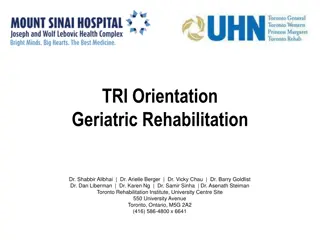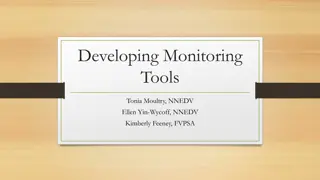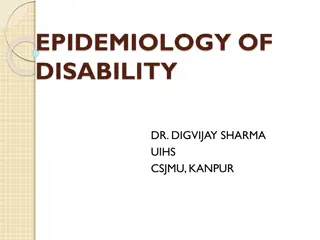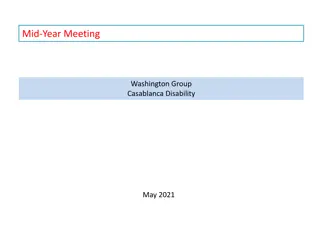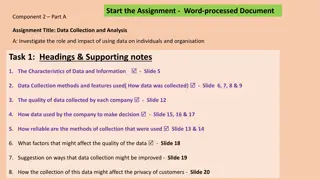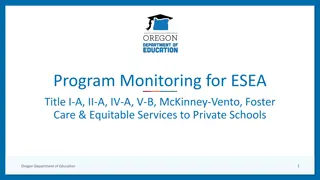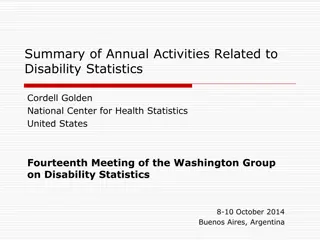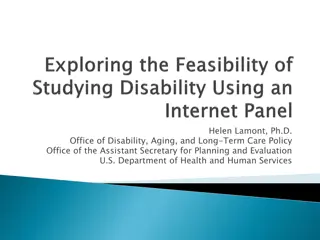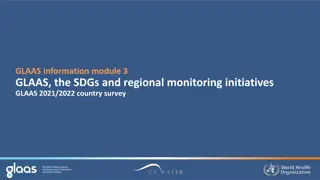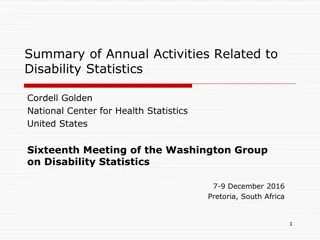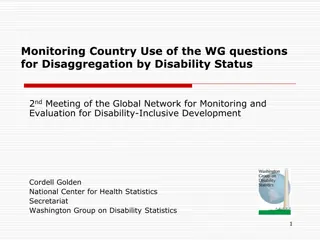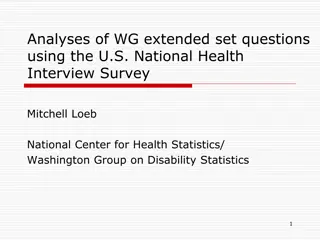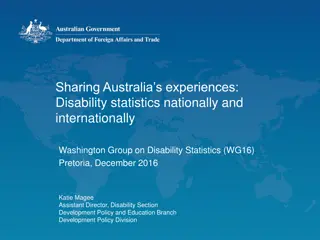International Initiatives for Disability Data Collection & Monitoring
This content discusses recommendations, strategies, and adoption of the Washington Group Short Set on Functioning in various international initiatives aimed at improving disability data collection and monitoring. Key events like the 14th Annual Meeting of the Washington Group and UN expert group meetings are highlighted, emphasizing the importance of using standardized methods like the WG SS-F for monitoring disability statistics globally.
Download Presentation

Please find below an Image/Link to download the presentation.
The content on the website is provided AS IS for your information and personal use only. It may not be sold, licensed, or shared on other websites without obtaining consent from the author.If you encounter any issues during the download, it is possible that the publisher has removed the file from their server.
You are allowed to download the files provided on this website for personal or commercial use, subject to the condition that they are used lawfully. All files are the property of their respective owners.
The content on the website is provided AS IS for your information and personal use only. It may not be sold, licensed, or shared on other websites without obtaining consent from the author.
E N D
Presentation Transcript
14thAnnual Meeting of the Washington Group on Disability Statistics Recommendations and Strategies for Implementation of the WG Short Set on Functioning (SS-F) Julie Weeks (U.S.A.) National Center for Health Statistics/ Washington Group on Disability Statistics
International Initiatives regarding the WG SS-F Recommendations for Monitoring: UN DESA/UNESCO Expert Group Meeting, Paris, July 2014 Follow-up conference on disability data, London, Oct 2014 Adoption in International Aid Programs: UK Department for International Development (DFID) US Agency for International Development (USAID) The 2020 Round of Censuses: UN Department of Economic and Social Affairs (DESA) UN Economic Commission for Europe (ECE)
Recommendations for Monitoring UN DESA / UNESCO Expert Group Meeting, July 2014 Disability Data and Statistics, Monitoring and Evaluation toward Disability Inclusive Development Agenda toward 2015 and Beyond The objective of the Meeting was to develop policy to strengthen disability statistics and data collection efforts by the international system and national statistics agencies. The work of the WG featured prominently at this meeting. The WG SS-F was endorsed as the standard for disaggregating data by disability for the purpose of monitoring the UN Convention on the Rights of Persons with Disability and the post-2015 Sustainable Developments Goals. London Conference, October 2014 Disability Data Demystifying Disability Statistics
Adoption in International Aid Programs UK Department for International Development (DFID) has recommended the use of the WG SS-F of questions in all projects and programs that collect data on disability or would disaggregate data on disability status. US Agency for International Development (USAID) has determined that a disability module will be included in a revision to the Demographic and Health Survey (DHS). This module will include the WG short set of questions.
The 2020 Round of Censuses Currently both the UN Department of Economic and Social Affairs (DESA) and UN Economic Commission for Europe (ECE) are preparing for the 2020 round of censuses. Expert group meetings, New York and Geneva, 2013-14 The WG has participated in both efforts, providing guidance on disability-related recommendations. In both instances, recommendations for the 2020 census round will include text that specifies the WG SS-F as the method endorsed for the collection of disability data cross-nationally.
The 2020 Round of Censuses Principles and Recommendations for Population and Housing Censuses: the 2020 Round Rev. 3 also denotes disability status as a core topic to be collected directly, similar to sex, age and marital status. Population census topics: D. Demographic and social characteristics (1) Sex (2) Age (3) Marital status (5) Religion (6) Language (7) Ethnicity (8) Indigenous peoples (9) Disability status








